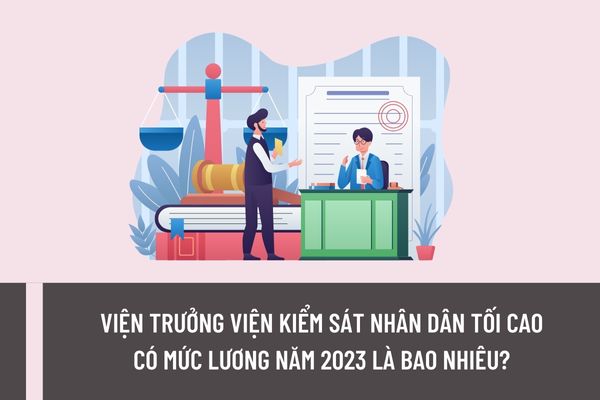How much is the salary of the Director of the Supreme People's Procuracy in 2023? What are the duties and powers of the Director of the Supreme People's Procuracy?
What is the salary of the Chief Procurator of the Supreme People's Procuracy in 2023?
Based on Section 2 of the Pay Scale Table for leadership positions of State officials issued with Resolution 730/2004/NQ-UBTVQH11, it is stipulated that the Chief Procurator of the Supreme People's Procuracy has two salary coefficient levels, which are 10.4 and 11.0.
Regarding the salary of the Chief Procurator of the Supreme People's Procuracy in 2023:
Based on Clause 1, Article 3 of Resolution 69/2022/QH15, the National Assembly has stipulated an increase in the statutory pay rate to 1.8 million VND per month from July 1, 2023. This translates to a salary range of 18,720,000 to 19,800,000 VND per month.
Thus, from now until June 30, 2023, the statutory pay rate will continue to be implemented as stipulated in Clause 2, Article 3 of Decree 38/2019/ND-CP, which is 1,490,000 VND per month. This corresponds to salaries of 15,496,000 VND and 16,390,000 VND.

What is the salary of the Chief Procurator of the Supreme People's Procuracy in 2023? What are the tasks and powers of the Chief Procurator of the Supreme People's Procuracy?
What are the tasks and powers of the Chief Procurator of the Supreme People's Procuracy?
Based on Article 62 of the Law on Organization of the People's Procuracy 2014 regarding the Supreme People's Procuracy:
Chief Procurator of the Supreme People's Procuracy
1. The Chief Procurator of the Supreme People's Procuracy shall be elected, dismissed, and removed by the National Assembly upon the recommendation of the President.
2. The term of office of the Chief Procurator of the Supreme People's Procuracy shall be aligned with the term of the National Assembly. When the National Assembly ends its term, the Chief Procurator of the Supreme People's Procuracy shall continue to perform his/her duties until the new National Assembly elects a new Chief Procurator of the Supreme People's Procuracy.
Therefore, the Chief Procurator of the Supreme People's Procuracy is elected by the National Assembly and serves a term concurrent with the National Assembly’s term.
Based on Article 63 of the Law on Organization of the People's Procuracy 2014 regarding the tasks and powers of the Chief Procurator of the Supreme People's Procuracy:
Tasks and Powers of the Chief Procurator of the Supreme People's Procuracy
1. Lead, direct, guide, inspect, and supervise the performance of tasks, work plans, and the construction of the People's Procuracy; decide on issues related to the operation of the Supreme People's Procuracy.
2. Issue circulars, decisions, directives, regulations, and operational policies applicable to the People's Procuracy.
3. Regulate the working apparatus of the Supreme People's Procuracy and submit it to the Standing Committee of the National Assembly for approval; decide the working apparatus of the lower level People's Procuracy; regulate the working apparatus of the Military Procuracy after consolidating with the Minister of National Defense, and submit it to the Standing Committee of the National Assembly for approval.
4. Submit to the President the appointment, dismissal, and removal of Deputy Chief Procurators and Procurators of the Supreme People's Procuracy.
5. Appoint, dismiss, and remove Senior Prosecutors, Intermediate Prosecutors, Primary Prosecutors, Investigators of all ranks, and Inspectors of all ranks.
6. Appoint, dismiss, and remove leadership and management positions under his/her authority.
7. Propose the development of laws and ordinances; direct the drafting and submission of laws and ordinances as prescribed by law; request the Standing Committee of the National Assembly to interpret the Constitution, laws, and ordinances.
8. Submit to the President his/her opinions on requests for clemency of the death penalty.
9. Direct and organize the review of prosecution practices and judicial supervision activities of the People's Procuracy.
10. Attend sessions of the Judicial Council of the Supreme People's Court discussing the unified application of the law.
11. Make recommendations to the Government of Vietnam, ministries, and central authorities in the fight against crime and legal violations.
12. Be accountable and report to the National Assembly on work; during the inter-sessional period, be accountable and report to the Standing Committee of the National Assembly and the President; respond to questions, proposals, and requests from National Assembly deputies.
13. Perform other duties and powers as prescribed by law.
Thus, the Supreme People's Procuracy has the tasks and powers listed above.
What are the qualifications to become the Chief Procurator of the Supreme People's Procuracy?
The qualifications for the title of Chief Procurator of the Supreme People's Procuracy are stipulated in Section 2.16, Subsection 2, Section 2 of Regulation 214-QD/TW of 2020 regarding the Chief Procurator of the Supreme People's Procuracy as follows:
- Ensure full general qualifications of a member of the Central Executive Committee.
- Possess qualities and competencies:
+ Have a high level of understanding and extensive knowledge of the Vietnamese legal system, international law, and practices.
+ Meet the standards for the title of Prosecutor of the Supreme People's Procuracy.
+ Have the ability to concretize and effectively implement the guidelines, policies of the Communist Party, and the laws of the State in the assigned field.
+ Have extensive experience in leading and directing the activities of judicial and prosecutorial bodies.
+ Be impartial and objective in directing investigations and prosecutions.
- Have experienced and excellently fulfilled duties in key leadership and management positions at the provincial level or led central committees, ministries, and central authorities.
LawNet